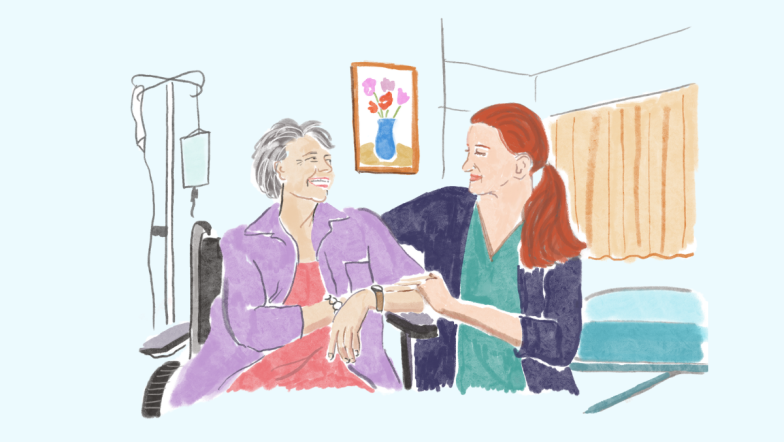Insights from our August COVID-19 response
21 Oct 2020
Since the outbreak of COVID-19, all our services have continued to run. We’ve been tailoring our response according to the qualitative and quantitative data we collect. We’ve also been using this data to assess where there is high legal need in the community and across multiple jurisdictions, so we can respond more effectively.
We hope that by sharing our insights we can support our peers across the sector and in government to make more collaborative and meaningful changes to the way we are responding to the pandemic.
This update will be focusing on our work in August. In particular, it will highlight how people find our resources online, how we’re improving pathways to seeking legal help, and the shifting demographics of people who have reached out to us for help
You can review finding from previous months by reading our Fair Matters blog posts.
Our data on demand for legal help in August
We broke a monthly record for website users in August, with 56,218 people accessing our website over the month, which was an increase by 33% from July.
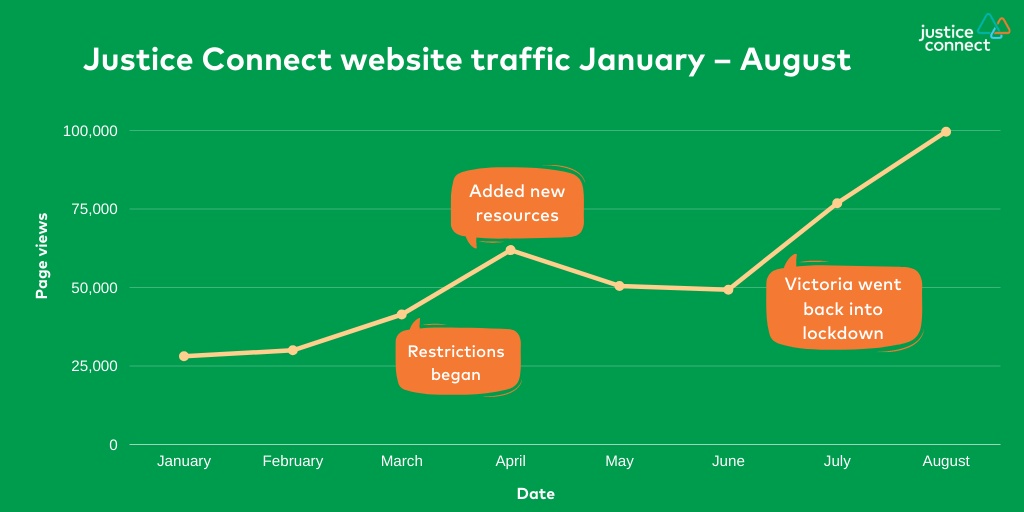
Over 45% of these users accessed our updated State of Emergency resource for Victoria. We saw an immediate spike once Stage 4 restrictions were announced at the beginning of the month and another when the Victorian Premier sought advice on extending the State of Emergency on the 24th of August.
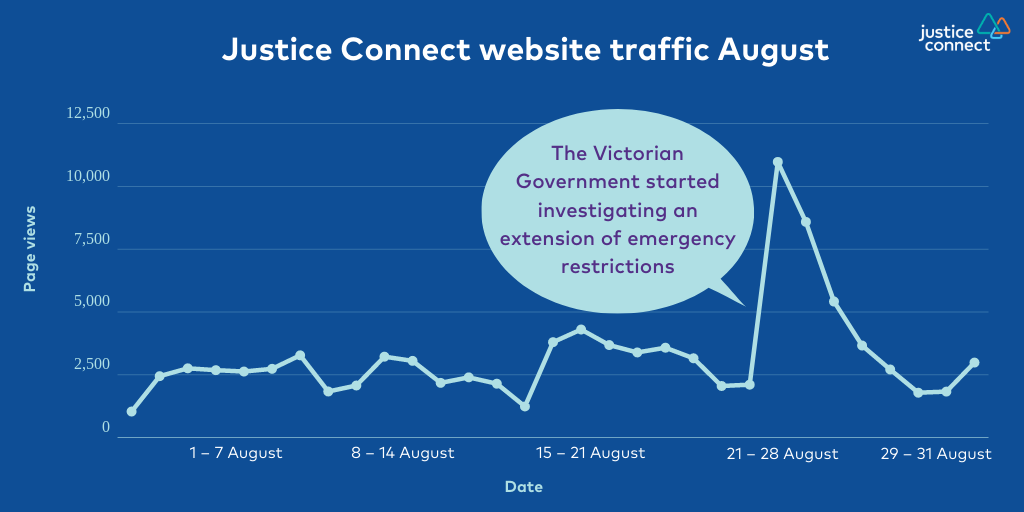
People submitted feedback on our Victorian State of Emergency resource that reflected the confusion the community was experiencing after each announcement from the Victorian State Government. Some of the feedback included:
- “Found what I was looking for immediately. Added to Bookmarks Thank you”
- “It confirmed what I knew about the State of Emergency is only to last a maximum 6 months. It does not state a maximum for State of Disaster? I also want to find out if a Premier can lengthen a State of Emergency?”
- “I have a question what happens when the maximum 6 month period of a state of emergency is up. Are lockdowns and restrictions finished and can no longer be enforced?”
This confirms the recommendation we made in our PAEC submission into the Inquiry of Victorian Government’s Response to COVID-19, that Government communication needs to be as clear, consistent and released early as possible.
We saw an increase in women seeking resources on solving financial problems
People who found our website via organic search were up by 64% from July, with the most accessed resource also being our State of Emergency resource, followed by our ‘How does COVID-19 affect Victorian renters?’ resource.
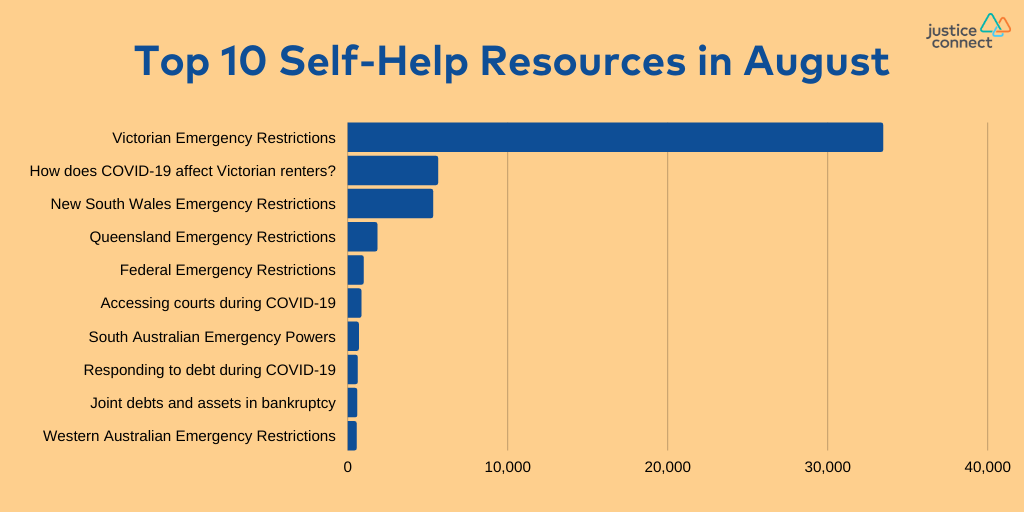
While our most-accessed resources remained relatively consistent to previous months, August saw a 38% increase in people accessing our ‘Solving Financial Problems during COVID-19‘ resource. Of people who accessed that resource, 60% were women compared to 40% men. This reflects recent data from the Australian Bureau of Statistics, which reported that job losses have predominantly hit industries dominated by female workforces.
Our online resources aren’t the only area where legal need across financial, employment and housing-related matters remains high. Justice Connect Answers is our online legal clinic that allows people to ask simple legal questions and have a lawyer provide discrete advice for free. Of the 50 questions asked on Justice Connect Answers in August, 28% were related to housing and homelessness, 16% to financial issues and 16% to work matters. These were the top categories people self-selected for their legal problems, other than the category “other” (18%).
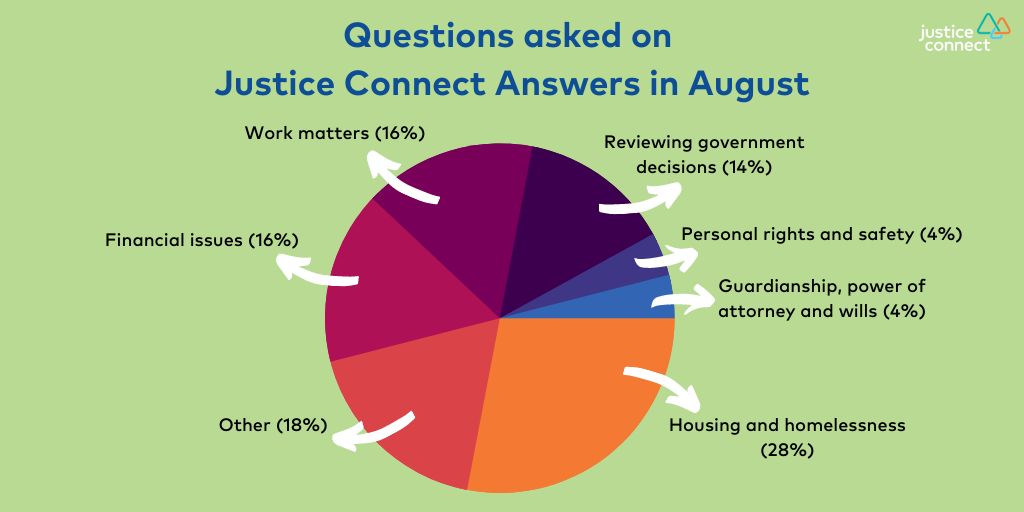
This reflects what we’ve learned from other months of our response to the pandemic: that the employment problems people are facing due to COVID-19 are escalating into legal problems related to financial insecurity and ultimately housing insecurity.
More young people accessed bankruptcy resources
One interesting insight from our August data was that more people aged 18–24 accessed our resource ‘What is a Sequestration Order’ than any other demographic. Overall, people aged between 18–34 made up 45% of all people who accessed the resource in August.
According to Federal court filings and Australian Financial Security Authority data, fewer people than ever are being pursued for bankruptcy. This is mostly due to the Federal government extending the increase on bankruptcy limits from $5,000 to $20,000 until 31 December 2020.
In order to receive a sequestration order, people had to have received a creditor’s petition, then a bankruptcy notice, and then go through a period of time of not complying with the bankruptcy notice. Then a sequestration order is issued by the court as a the final step in the process.
95% of people found this resource through search results. Beyond accessing it for education purposes, we don’t have any conclusive evidence as to why this resource continues to be accessed at such high rates for this younger demographic.

More young people are being impacted by the COVID-19 related recession and facing increasing financial insecurity. The Federal Government also announced an extension to JobKeeper, though at a reduced rate below the poverty line. While a fiscal slope is better than a fiscal cliff, we’re concerned that upcoming reductions will further increase the number of people — especially young people — facing financial and employment problems.
What we learned about Dear Landlord in August
In July, we updated our Dear Landlord self-help tool to accommodate the changes in law and circumstance due to COVID-19. You can read more about that in our last update. In August, we continued to see a spike in traffic towards Dear Landlord, especially as Victoria entered Stage 4 restrictions.

While 21% of people who used Dear Landlord answered that they were impacted by COVID-19 in March when restrictions were first introduced, the majority of users (39%) were impacted in August during the second wave of restrictions. This could be due to broader trends in tenancy issues or because we relaunched Dear Landlord to respond to the impacts of COVID-19 on renters.
As restrictions continue to take a financial toll on Victorian renters, we expect to see higher use of Dear Landlord continue.
In August, we tested promoting our Dear Landlord tool across different demographics. We tested whether people are more likely to use our tool when we refer to it as an “app”, a “tool” or simply “Dear Landlord’”. “Dear Landlord” won the test by a large margin, meaning we will continue to be mindful about the way we refer to our tools, especially considering unconscious bias people may have against the term “apps”. Many users may assume that using the “app” involves downloading something, when in fact Dear Landlord functions directly on any browsers and on any device.
As we reported last month, the most common pathways people chose when using Dear Landlord were to negotiate a rent reduction agreement by preparing a draft letter or ending a lease agreement.
We ran conservative split tested ads for Dear Landlord with messaging reflecting the different situations:
- A – Are you worried about Jobseeker changes impacting rent?
- B – Have you negotiated a rent reduction that’s about to expire?
- C – Have you lost work due to Stage 4 Restrictions?
- D – Do you need to end your lease early?
- E – Did your landlord refuse to negotiate a rent reduction?
Against a broad audience of people aged 18–50 in Victoria, the “Did your landlord refuse to negotiate” messaging won with a 76% chance that it would win again if we retested. An age split found that “ending a lease” was the highest concern for the 35–44 demographic. This correlates with our data which shows that ‘I want to end my lease’ is the second most accessed resource for Dear Landlord in August.
Tenancy remains a critical issue for Victorians
Our Homeless Law service received 121 enquiries in August, up from 111 in July. Most of these enquiries (75%) were related to tenancy and housing. Despite the moratorium, eviction remains a prominent issue for Victorians, and this was highlighted in our August enquiries. Of these tenancy and housing legal issues, 68% were eviction-related. Eviction for rental arrears made up 17% of all August enquiries despite clear direction from the government to landlords to act in good faith during this pandemic.
This trend is highlighted in the recent AHURI report ‘Renting in the time of COVID-19′, which found that 6-7% of Victorian renters they surveyed had received an eviction notice during COVID-19. We have also seen landlords refusing to negotiate a rent reduction agreement, and more tenants needing assistance to access the Consumer Affairs Victoria dispute resolution scheme to negotiate rent reduction agreements or extend them. Extra pressure was being placed on renters in August because renters were trying to negotiate rent reduction agreements expiring at the same time as experiencing cuts to JobSeeker and JobKeeper rates in September.

Looking forward
In August, both the Victorian and Federal government extended several critical COVID-19 related policies, including:
- Extending the eviction moratorium from 26 September 2020 to 28 March 2021
- Extending temporary changes to bankruptcy and insolvent trading laws until 31 December 2020
- Extending JobKeeper until 28 March 2021, though at reduced rates.
We will continue to monitor legal need as reduced JobKeeper rates put increased pressure on business owners and employees. As we have seen throughout our response to the COVID-19 pandemic, employment and financial problems have a flow-on impact on people’s ability to stay in safe and secure housing. We will continue to promote our resources on financial, tenancy and employment problems over the coming months.
In our September analysis, we expect to see previously negotiated rent reduction agreements come to an end, as initial changes to rental laws were expected to finish. We’ll provide more context on this in our next update.

